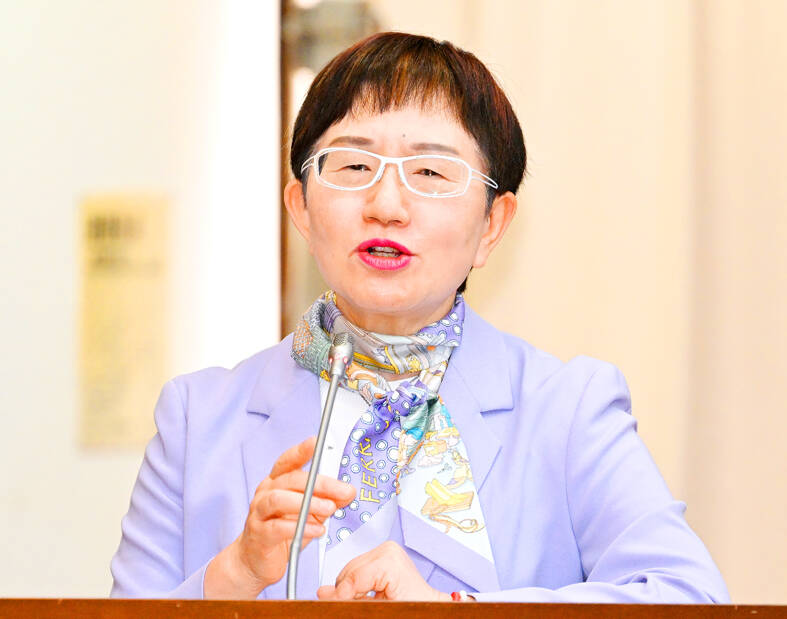The Ministry of Finance is open to expanding the NT$500 billion (US$15.38 billion) National Stabilization Fund (NSF) to more effectively counter the effects of negative external factors on the local stock market, Minister of Finance Chuang Tsui-yun (莊翠雲) said yesterday.
A possible expansion could make the fund more effective given a significant rise in market capitalization in the past decade, Chuang said at a meeting of the legislature’s Finance Committee in Taipei.
The ministry would address the issue after Democratic Progressive Party Legislator Kuo Kuo-wen (郭國文) initiates an amendment to the Statute for the Establishment and Administration of the National Financial Stabilization Fund (國家金融安定基金設置及管理條例) that would raise the size of the fund to NT$1 trillion.

Photo: Liao Chen-hui, Taipei Times
Under the statute, the NSF can utilize two sources of funding.
It can borrow from financial institutions, collateralized by stock held by the National Treasury Administration in public and private enterprises, with a ceiling of NT$200 billion.
It can also borrow from the postal deposit system, Postal Life Insurance Fund, Labor Insurance Fund, Labor Pension Fund and Civil Servant Pension Fund, with a ceiling of NT$300 billion.
Kuo has proposed removing the ceilings of the two borrowing sources to allow the NSF flexibility in raising funds to counter turbulence in the market.
The stabilization fund was set up in 2000 to serve as a buffer against unexpected external factors that might disrupt the local stock market.
The market’s value has soared to more than NT$70 trillion from NT$8 trillion in 2000, Kuo said.
When the local stock market encountered headwinds from tariff threats from US President Donald Trump’s administration, the stabilization fund’s committee intervened starting from Tuesday last week, the ninth intervention since its establishment.
The stabilization fund has never used the second borrowing source and the committee’s executive secretary — Deputy Minister of Finance Frank Juan (阮清華) — is careful when managing the fund to support the market and shore up investor confidence, Chuang said.
Chuang said she has closely watched the decline in turnover in the local stock market as many investors stayed on the sidelines amid tariff concerns.
The average combined turnover of the main board and the over-the-counter market shrank 27.4 percent year-on-year to NT$400.4 billion last month, the ministry said.
Tax revenue from securities transactions last month fell 24.6 percent to NT$21.9 billion from a year earlier, the steepest decline in 26 months, ministry data showed.

TAKING STOCK: A Taiwanese cookware firm in Vietnam urged customers to assess inventory or place orders early so shipments can reach the US while tariffs are paused Taiwanese businesses in Vietnam are exploring alternatives after the White House imposed a 46 percent import duty on Vietnamese goods, following US President Donald Trump’s announcement of “reciprocal” tariffs on the US’ trading partners. Lo Shih-liang (羅世良), chairman of Brico Industry Co (裕茂工業), a Taiwanese company that manufactures cast iron cookware and stove components in Vietnam, said that more than 40 percent of his business was tied to the US market, describing the constant US policy shifts as an emotional roller coaster. “I work during the day and stay up all night watching the news. I’ve been following US news until 3am

UNCERTAINTY: Innolux activated a stringent supply chain management mechanism, as it did during the COVID-19 pandemic, to ensure optimal inventory levels for customers Flat-panel display makers AUO Corp (友達) and Innolux Corp (群創) yesterday said that about 12 to 20 percent of their display business is at risk of potential US tariffs and that they would relocate production or shipment destinations to mitigate the levies’ effects. US tariffs would have a direct impact of US$200 million on AUO’s revenue, company chairman Paul Peng (彭雙浪) told reporters on the sidelines of the Touch Taiwan trade show in Taipei yesterday. That would make up about 12 percent of the company’s overall revenue. To cope with the tariff uncertainty, AUO plans to allocate its production to manufacturing facilities in

COLLABORATION: Given Taiwan’s key position in global supply chains, the US firm is discussing strategies with local partners and clients to deal with global uncertainties Advanced Micro Devices Inc (AMD) yesterday said it is meeting with local ecosystem partners, including Taiwan Semiconductor Manufacturing Co (TSMC, 台積電), to discuss strategies, including long-term manufacturing, to navigate uncertainties such as US tariffs, as Taiwan occupies an important position in global supply chains. AMD chief executive officer Lisa Su (蘇姿丰) told reporters that Taiwan is an important part of the chip designer’s ecosystem and she is discussing with partners and customers in Taiwan to forge strong collaborations on different areas during this critical period. AMD has just become the first artificial-intelligence (AI) server chip customer of TSMC to utilize its advanced

Six years ago, LVMH’s billionaire CEO Bernard Arnault and US President Donald Trump cut the blue ribbon on a factory in rural Texas that would make designer handbags for Louis Vuitton, one of the world’s best-known luxury brands. However, since the high-profile opening, the factory has faced a host of problems limiting production, 11 former Louis Vuitton employees said. The site has consistently ranked among the worst-performing for Louis Vuitton globally, “significantly” underperforming other facilities, said three former Louis Vuitton workers and a senior industry source, who cited internal rankings shared with staff. The plant’s problems — which have not